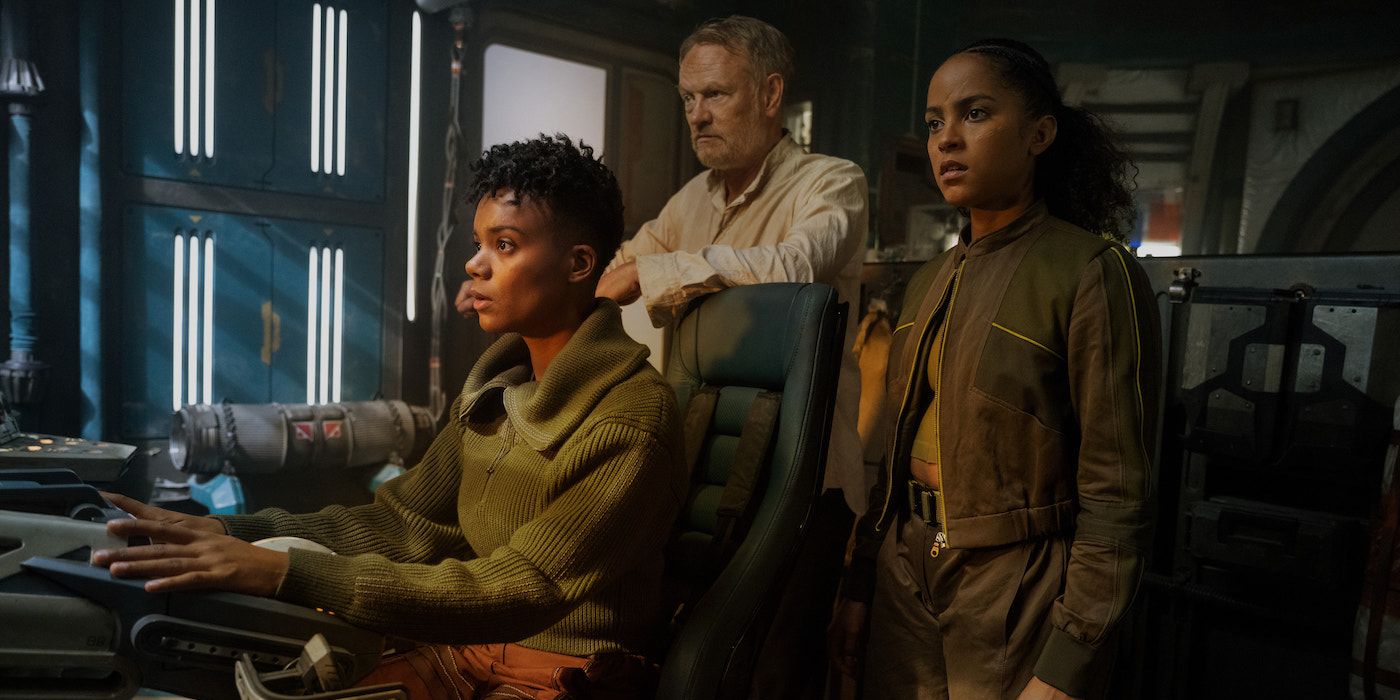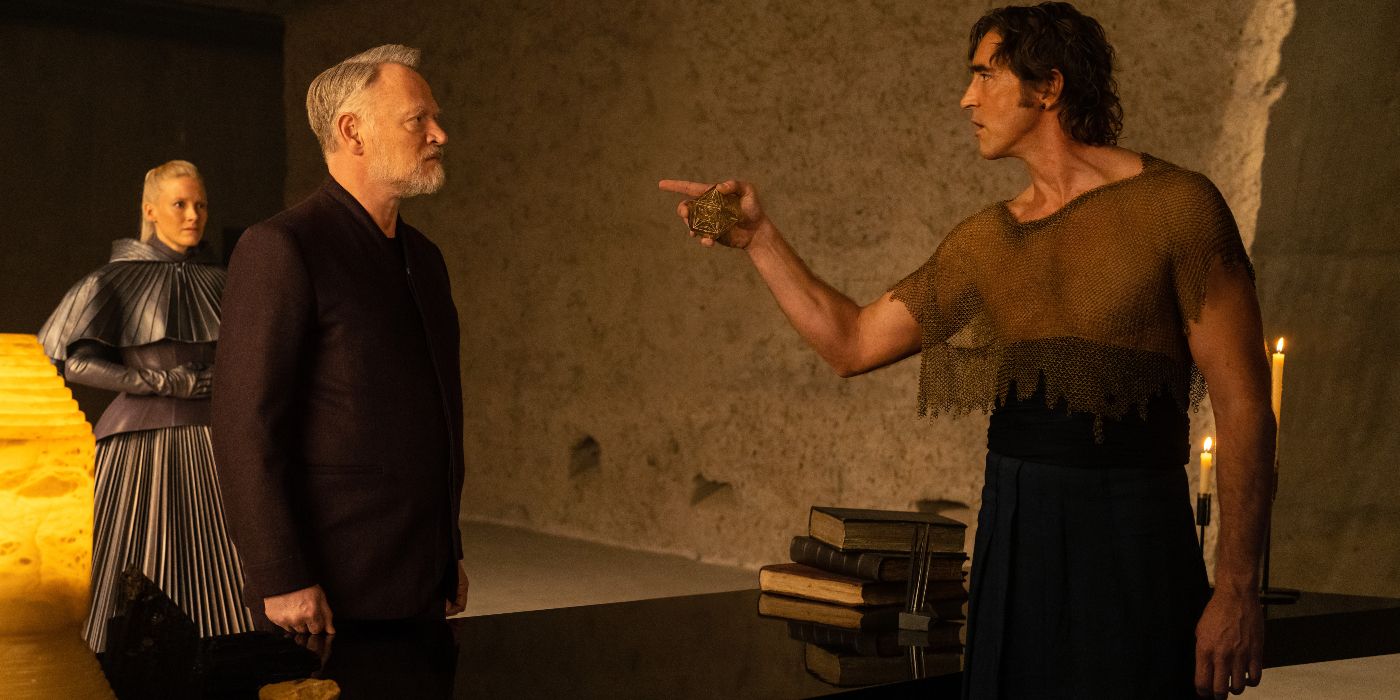There is something uniquely fascinating about David S. Goyer’s Foundation, one of many well-written science fiction shows on Apple TV+ that have proven to be their defining bread and butter, in how it very loosely adapts its source material. Drawing inspiration from the series of novels of the same name by the late Isaac Asimov, the show’s first season made immediately clear that it had much different goals and stories to explore than the author. It was disappointing to those who were looking for a more faithful adaptation, with some feeling like it was sidestepping some of the deeper questions Asimov was asking, but the show has still managed to create a distinct experience with plenty of potential. Some of this comes down to character, with a whole host of players being given more of a role in the story, but we could only see the first threads of this vast tapestry. Asimov’s writings are themselves only the foundation for a series that is now building into a visual epic all its own. This second season finds a richness when it simultaneously pushes into the vast reaches of the galaxy and delves deeper into the minds of its characters. It can be scattered at times, but the strength of the vision we hurtle into makes it a science fiction gem.
At the center of this is Hari Seldon, played once more by the great Jared Harris, who is made a much more integral part of Foundation Season 2 than the last. The precise form that this takes is best left to the show so as not to take away from some of the discoveries made on his journey. Suffice it to say, we are taken through time and space itself more than ever before as we trace the ripples of his predictions about the end of the Empire. There is nothing quite as explosive as the beginning of Season 1, a creation of the series that effectively established the stakes of what was in store, but there is a solid amount of action here as well. Salvor (Leah Harvey) and Gaal (Lou Llobell) have found themselves in the same time, learning they are actually mother and daughter with a second crisis that is coming. One can look to the future and the other to the past, creating a poetic state of being for each as they are similar though different in fundamental ways. While they travel across the galaxy, the sociopathic ruler Brother Day (Lee Pace) is back home going through a bit of a personal crisis while growing rather intimate with Demerzel (Laura Birn), who is essentially his robotic mother. After all, what would this story about a coming fight for power in a universe on the brink of annihilation be without a little pseudo-incest?
‘Foundation’ Season 2 Signals a Coming Storm
There is a lot more to the story that would require a massive diagram to lay out — or, in Seldon’s case, a mathematical formula using his knowledge of psychohistory. However, the core that makes Season 2 so compelling comes in how the stage is being set for something more potentially catastrophic. Foundation already spans hundreds of years in the first season and this second one doesn’t shy away from this, showing how the rising crisis is something few are remotely prepared for. In this regard, it feels more akin to the closing of the House of the Dragon in how all the fragments come together for a fight that may shatter the universe as the characters know it. Each of them, new and old, is dispersed across the galaxy, though there is the potential that destruction may come for them all soon.
Most interestingly, Season 2 starts to look much closer at the potential that those like Seldon could very well be false prophets whose arrogance obscures their vision more than they would ever want to admit. The conversations we get with all the… let’s just say, versions of the character as he discusses this see Harris reveling in the role. There is a madness in his eyes that is taking hold, making it hard to tell how much of the faith those like Salvor and Gaal have put in him may be misguided. There are other characters who similarly risk their lives for this mission, and are willing to sacrifice themselves for a future they will likely never see, but the most moving dynamics come from those two. If anything, some of the other storylines can feel like a sideshow to what they are facing. Still, some good arcs draw us in and reveal the darker corners of the empire that we had only gotten allusions to before. It is world-building not just for the sake of itself, but to show the cost of failure. All the corners of the galaxy, including one that almost resembles another Apple TV+ series See, are what is worth saving from the creeping rot that seeks to consume them.
The origin of this rot largely comes back to Brother Day, who represents a unique threat of a dictator in how he can create copies of himself, ensuring his cruel reign will never actually see an end. In embodying this, Pace continues to give one of his best performances to date. He captures the petulance of the character which is made all the more frightening when considering how he can utterly destroy almost anything that he wants. His terrifying monologue from the end of Season 1 looms large over this as we know he has nearly unlimited resources to carry out vengeance on any who cross him. Brother Day is also an imposing figure on his own, getting in a naked fight where his ruthlessness is not the only thing on full display.
There is a humor that Pace brings to the character, showing Day’s insecurities when he is challenged with an almost pouty face that is just delightful. He is the type of villain that is worth building an entire show around, making his creation for this story a worthwhile one. His ignorance of so much that is happening around him makes him feel more dangerous as there is always the potential that he could lash out without warning. Alongside him, Birn as Demerzel is just spectacular. Playing a robotic character is never an easy undertaking, but she makes it look that way, maintaining a real command of her physicality while we see small hints of her inner state cross over her features. The greater insights into their relationship, physical and emotional, with one episode towards the end proving to be a standout, all work because of these two stellar performers. Each turns the scenes that may be dominated by exposition into tense ones, where palace intrigue could spell doom for all of existence itself.
‘Foundation’ Season 2 Struggles in Its Subplots but Thrives as a Whole
The most prevailing hesitation in this season comes down to how it ties together. Many components can feel a bit extraneous, dulling the impact of the more vibrant aspects of discovery and exploration ever so slightly, though such is the reality of any show that is structured in such a fashion. There will likely always be plots within the greater whole that aren’t quite as resonant, but the general trajectory Foundation is on feels grimly thrilling. It is occasionally heady storytelling, but it’s still wonderful to see it done so uncompromisingly. The more time that it covers, leaping both into the future and the past, as well as expanding the scope of its narrative, the more it may lose the casual viewer. However, for those willing to go along with it, the science fiction rewards Foundation offers is unlike anything else out there on television right now.
More than just the spectacle of the explosions at the end of the season, of which there are many, it is the emotional and thematic ambition underpinning Foundation Season 2 that pulls it all together, even as everything for the characters is beginning to come apart. It will always be a different beast than Asimov’s writing, but this second season has shown that it is a ride worth going on all the same.
Rating: B+
The first episode of Foundation Season 2 premieres July 14 on Apple TV+, with the remaining nine episodes releasing weekly.
Source link



